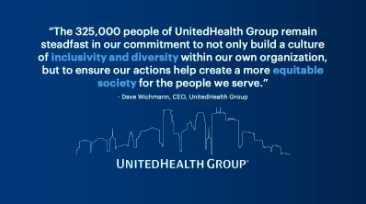The last couple weeks, amidst the marches and protests, we started to see companies put speaking up racial injustice–with their pocketbooks.
Many people would say, “it’s about time.”
To be fair, some companies, like Ben & Jerrys, have been speaking up for years, and making a difference with their investments.

But, in the last two weeks, you started to see a whole flurry of companies do the same–companies you might not have expected to move so quickly.
United Health Group donated $10 million and 25,000 volunteer hours to support Mr. Floyd’s family, help Minneapolis-St. Paul businesses restore operations, and fund efforts to advance equality and inclusivity in the Twin Cities community.
US Bank announced “several investments and initiatives to bridge social and economic gaps and enhance opportunity for people of color.”
Target donated “$10 million commitment and ongoing resources to advance social justice and support rebuilding and recovery efforts in local communities.”
And, the Jordan Brand pledged a whopping $100 million to nationwide organizations “dedicated to ensuring racial equality, social justice and greater access to education.”
We saw more CEOs come forward with messages of support for Black Lives Matter. Jack Salzwedel with American Family Insurance. Medtronic CEO, Geoff Martha. Citi CFO Mark Mason. And many more.
So, we’ve seen a lot of movement in the last couple weeks. Public momentum and support seems to be growing–and that’s a good thing. The big question now is: How do companies sustain this momentum and what do they need to do long-term to keep it going?
I want to make an important preface here: Who the heck cares what I think, right? I’m a middle-aged white guy. My demographic is a huge part of the problem. So, two things: 1) I’d welcome the thoughts and suggestions of any people of color who read this blog who’d like to weigh in; I’d welcome the chance to feature your opinions in a separate post; and 2) We actually need middle-aged (and older) white guys to speak up. Again, our age demo is a part of the problem. So, I know my opinion is inconsequential compared to that of a person of color. But, I also believe I need to speak up to help enact change.
So, here’s what it seems we need to see more of from companies in terms of longer-term, sustainable change:
Create more opportunities for more African Americans in leadership positions
We’ve been talking about this for years, but now feels like the time to make this happen more broadly. Because right now, what do we see? We see boards of directors made up almost entirely of old white guys (and some women). We see old white guys making up the lion’s share of CEOs. And we see leadership teams made up of mostly old white guys, a few women and maybe a handful of African-Americans. These changes need to happen because it’s the right thing to do. But, also: because it makes good business sense. According to the latest census, African-Americans make up 13.4% of the US population. That’s a minority of our population–for sure. But, it also represents a lot of buying power. Bigger picture–who do you see at all these rallies around the country? Young people–black AND white. They have buying power, too. And, according to research, they tend to buy more from companies who support and align with their values than older people.
Create more opportunities–and a culture–that fosters more African American-led agencies
The ad and PR worlds have long been dominated by white people. In fact, when I recently tried to think about a list of African-American colleagues in the PR/comms industry, I’m afraid to say it was a pretty short list. Again, this isn’t a new issue and I know many people are aware of it–and some have even worked hard to promote it (The Brand Lab being one of the best local examples). But, it feels like we, as an industry, need to do more. More to promote the ad/comms/PR industry as a viable career alternative for POC. More to promote entrepreneurial opportunities for POC to start agencies and lead them. It’s not going to be enough just to have a few African-American people on your team. There needs to be more opportunities for POC to lead, to flourish, and to own.
Provide more opportunities for African-Americans to get more involved with PR/comms at an early age
Again, The Brand Lab is a great example of work already being done in this area. And, I sent them a note just this week to volunteer. So, there’s one opportunity where more of us could help. Because if we’re going to accomplish the other items above, we first need more POC to start careers in PR/comms. I taught as an adjunct at the University of St. Thomas this last year. I taught two classes of roughly 15 people each. I had exactly one POC in both classes. We can do better here. I’m not sure how it happens, but like I said above, I’m starting by volunteering and contributing to the Brand Lab as my start.
Like I said above, I know my voice matters far, far less than others in this discussion. So, if you are a POC and you’d like to share your opinions on this topic, send me a note at arik@arikhanson.com because I’d like to hear from you and amplify your voice–because it certainly matters. A lot.

0 Comments